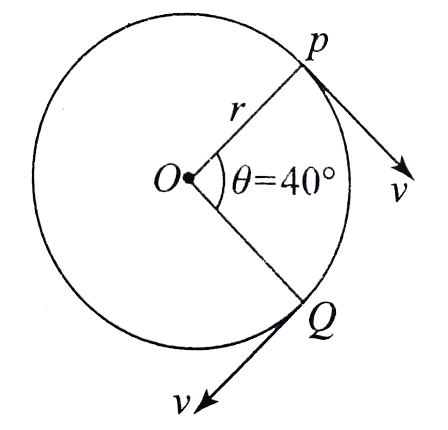A particle is moving on a circular path of radius R with constant speed v. During motion of the particle form point A to point B

−NH2
−Oɵ
−O∣∣C−O∣∣C−CH3
−O∣∣C−NH−CH3
The correct Answer is:C, D
−O∣∣C−NH−CH3 and −O∣∣C−O∣∣C−CH3 do not contain lone pair of electron negative charge on first atom.
Topper's Solved these Questions
- TEST PAPERSBook:RESONANCE ENGLISHChapter:TEST PAPERSExercise:PHYSICS
Explore 784 Videos
- TEST PAPERSBook:RESONANCE ENGLISHChapter:TEST PAPERSExercise:PART - II PHYSICS SEC - 2
Explore 20 Videos
- SIMPLE HARMONIC MOTION Book:RESONANCE ENGLISHChapter:SIMPLE HARMONIC MOTION Exercise:Advanced Level Problems
Explore 13 Videos
- TEST SERIESBook:RESONANCE ENGLISHChapter:TEST SERIESExercise:PHYSICS
Explore 130 Videos
Similar Questions
Knowledge Check
A particle is moving on a circular path of radius r with uniform speed v. What is the displacement of the particle after it has described an angle of 60∘?
Ar√2Br√3CrD2rA particle is moving on a circular path with a constant speed v. Its change of velocity as it moves from A to B is:
 A2vsin(2θ)BzeroC2vsin(θ2)D2vcos(θ2)
A2vsin(2θ)BzeroC2vsin(θ2)D2vcos(θ2)the circular motion of a particle with constant speed is
Aperiodic and simple harmonicBsimple harmonic but not periodicCneither periodic nor simple harmonicDperiodic but not simple harmonic
A particle is revoiving in a circular path of radius 25 m with constant angular speed 12 rev/min. then the angular acceleration of particle is
View SolutionA particle of mass m is moving on a circular path of radius r with uniform speed v , rate of change of linear momentum is
View SolutionA particle is revolving in a circular path of radius 2 m with constant angular speed 4 rad/s. The angular acceleration of particle is
View SolutionA particle is moving on a circular path with constant speed v. it moves between two points A and B, which subtends and angle 60∘ at the centre of circle, The magnitude of change in tis velocity and change and magnitude of its speed during motion from A to B are respectively
View Solution
A particle is moving on a circular path of radius r with uniform velocity v. The change in velocity when the particle moves from P to Q is (∠POQ=40∘)
View Solution

